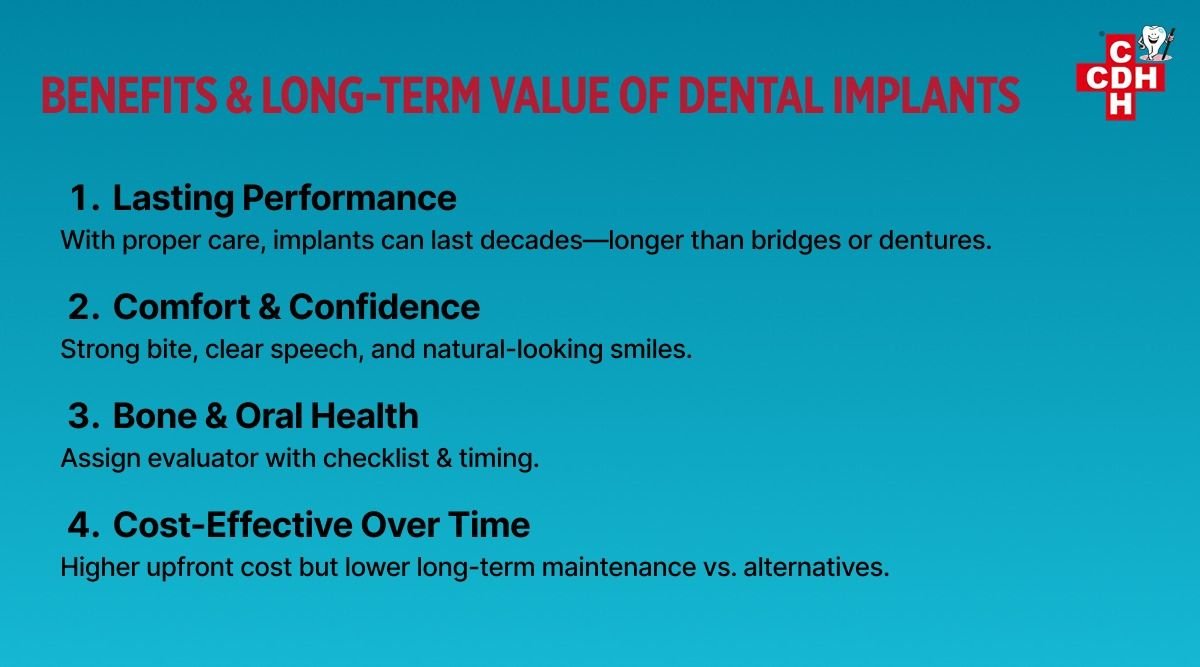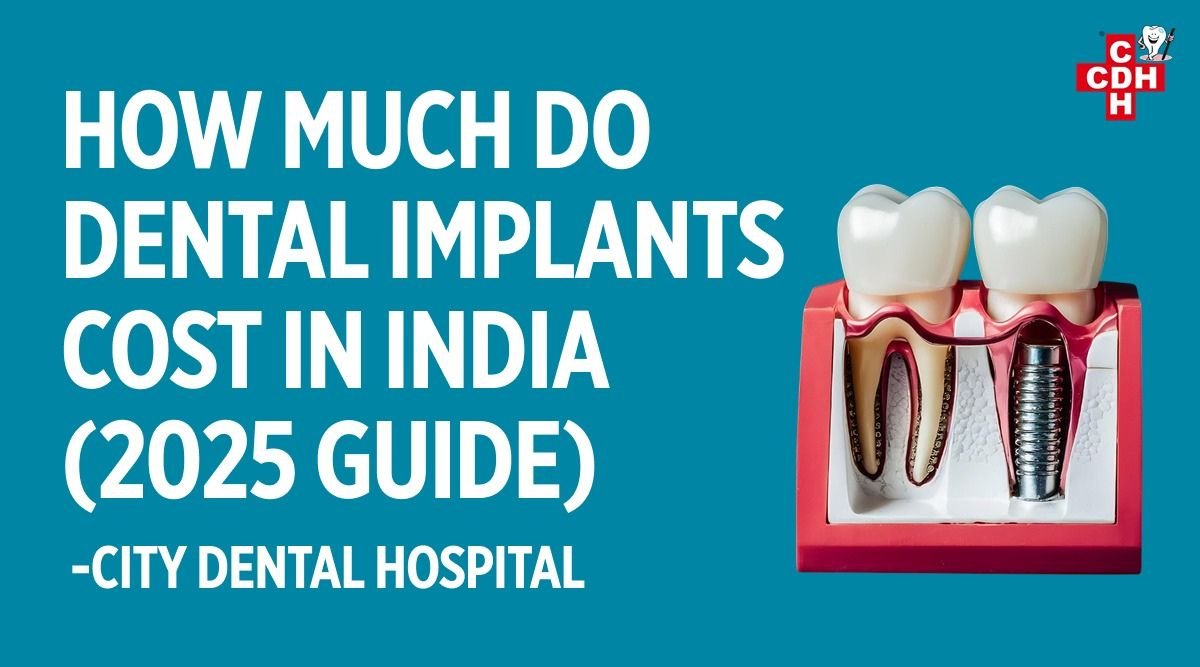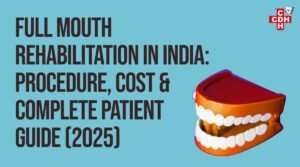A dental implant is a small, biocompatible screw that takes the place of a lost tooth’s root. After placement in the jawbone, the surrounding bone gradually fuses with the implant, anchoring it firmly. Once healed, a connector piece (abutment) is attached, and a custom-made crown or bridge is fixed on top. The finished restoration looks and works like a natural tooth, restoring normal biting strength and helping the jawbone stay healthy.
Understanding dental implant cost in India means weighing more than the price of a single component. The brand of implant, 3D imaging technology, clinic location, surgeon expertise, and any preparatory procedures, such as bone grafting, all influence the final figure. Yet even with these variables, implants remain one of the most cost-effective, long-term solutions compared with the ongoing maintenance that can accompany conventional bridges or dentures.
Suppose you’ve been searching online for the best fake teeth price or wondering whether 2025’s technological advances have made implants more affordable. In that case, this guide walks you through today’s realistic pricing, hidden savings, all with insight drawn from City Dental Hospital’s implant expertise.
What is the Average cost of Tooth Implant in India?
On average, a single tooth implant cost in India including its crown, ranges from ₹20,000 to ₹50,000, depending on the implant brand and clinical setup.
When all teeth in the upper or lower jaw must be replaced, the Dental implant cost per arch runs around ₹2 lakh – ₹4 lakh, depending on the city
Implants restore confident chewing and a natural-looking smile that can last for decades, making them a smart investment despite the upfront cost.
India’s thriving dental-tourism scene lets international patients combine world-class care with savings of up to 70 percent on treatment.
Choosing the right implant isn’t just a clinical decision—it’s about daily comfort, confidence, and long-term value. Here’s a plain-language look at four popular options and why each one might be the best fit.
What are the Different types of Dental Implants and their cost
Choosing the right implant isn’t just a clinical decision—it’s about daily comfort, confidence, and long-term value. Here’s a plain-language look at four popular options and why each one might be the best fit.
Single-Tooth Implant
Need to replace just one missing tooth?
A slender titanium “root” integrates with the jaw, and a custom crown snaps on top, restoring strength while neighbouring teeth stay untouched. For a detailed breakdown, see the guide on Single tooth implant cost in India 2025.
Implant-Supported Bridge
Missing two or three teeth in a row?
Instead of placing an implant for every space, two implants act like sturdy bookends and hold a bridge of new teeth between them. Chewing feels natural, and healthy neighbouring teeth don’t need to be filed down the way they would for a traditional bridge.
All-on-4 Implant System
Looking for a quick full-arch solution?
Four strategically angled implants anchor an entire row of fixed teeth. Because fewer implants are needed and they avoid weak bone areas, many patients walk out with a secure, good-looking smile the very same day. Explore the full procedure and cost breakdown in All-on-4 dental implants in India.
All-on-6 / All-on-8 Implant Systems
Want extra stability for heavy chewing or softer bone?
Adding two or four more implants spreads the bite forces evenly across the jaw. That extra support means greater durability, especially for those who love tougher foods or have reduced bone density. For a detailed breakdown, see the guide on All-on-6 dental implants cost in India.
| Implant type | Dental Implant Cost in India in 2025 (INR) | When to choose | Benefits |
| Single-tooth implant | 20,000 – 50,000 | One missing tooth, neighbouring teeth are healthy | Preserves bone; independent crown |
| Implant-supported bridge | 40,000 – 1,00,000 | Two – three adjacent gaps | Fewer posts; spares natural teeth |
| All-on-4 (per arch) | 3,00,000 – 7,00,000 | Full arch loss, limited bone | Same-day fixed teeth; minimal grafting |
| All-on-6 (per arch) | 5,00,000 – 9,00,000 | Full arch with higher bite force | Extra stability; even load distribution |
| All-on-8 (per arch) | 6,00,000 – 10,00,000 | Softer bone or heavy chewing | Maximum anchorage; greater longevity |
| Full-mouth restoration (both arches) | 6,00,000 – 24,00,000 | Complete upper + lower tooth loss | Total smile makeover; full chewing function |
Figures show typical ranges; actual fees vary with implant brand, prosthetic material, bone grafting, and surgeon expertise.
Key Factors Influencing Tooth Implant Cost in India
Number of implants
Why it Matters: Replacing one gap needs a single fixture, whereas a full arch may call for four, six, or more.
Impact on Pricing: More implants = higher tooth implant cost overall.
Implant material & brand
Why it Matters: Standard titanium systems are widely used; zirconia or premium brands such as Straumann, Nobel Biocare, or Osstem have a higher tooth implant price.
Impact on Pricing: Premium Materials can add 10–25 % to the bill.
Clinic location & reputation
Why it Matters: Metro Cities with advanced facilities and international accreditation often charge more than tier-2 or tier-3 centres like Rajkot.
Impact on Pricing: Location can influence dental implant cost by a sizable margin.
Surgeon expertise & technology
Why it Matters: Specialists who use CBCT scans, 3-D printing, CAD/CAM guides, or laser surgery deliver greater precision but have higher overheads.
Impact on Pricing: State-of-the-art workflows generally raise the price.
Bone quality & preparatory work
Why it Matters: Bone grafts, sinus lifts, or ridge augmentation are sometimes needed before placement.
Impact on Pricing: Each additional procedure adds to the artificial teeth price.
Prosthetic material
Why it Matters: Crowns or bridges can be acrylic, PFM, or full-contour zirconia.
Impact on Pricing: High-strength zirconia restorations push the fake teeth price upward.
Additional items
Why it Matters: Consultation, digital imaging, sedation, post-op reviews, and maintenance visits are billed separately at many clinics.
Impact on Pricing: Ancillary fees may account for 5–15 % of the final invoice.
Dental Tourism In India & Savings
Dental Tourism in India draws thousands of international visitors each year for implant care thanks to three big advantages: highly trained specialists, cutting-edge tech found in metro, tier-2, or tier-3 clinics like Rajkot’s City Dental Hospital, and fees that undercut Western markets by a wide margin.
A single implant that might run only a few tens of thousands of rupees in India can cost many times more in countries such as the USA, the UK, Australia, or Canada. Because dental implant costs overseas often include higher clinical fees, insurance hurdles, and steeper lab charges, patients often discover that the overall tooth implant price back home is simply out of reach.
By contrast, India’s combination of skilled clinicians, modern technology, and competitive overheads keeps the artificial teeth price far lower, sometimes trimming as much as 70 % off what patients in the West pay for the same treatment. For anyone researching tooth implant cost abroad, India’s value proposition makes the local fake teeth price hard to beat without compromising on quality.
Cost Comparison for a Single Dental Implant (Typical 2025 Clinic Quotes)
| Country / Region | Typical cost per implant* | Estimated savings when choosing India |
| India | ₹20,000 – ₹50,000 (≈ US $240 – $600) | — |
| United States | US $3,000 – $5,000 | 70 – 85 % |
| United Kingdom | £1,800 – £3,000 (≈ US $2,300 – $3,800) | 65 – 80 % |
| Australia | AU $2,400 – $5,000 (≈ US $1,600 – $3,300) | 60 – 75 % |
| Canada | CA $3,000 – $4,500 (≈ US $2,200 – $3,300) | 65 – 80 % |
| Mexico | US $1,000 – $1,800 | 50 – 70 % |
| Turkey | US $900 – $1,500 | 55 – 65 % |
| Thailand | US $1,200 – $2,000 | 60 – 70 % |
| Hungary | US $1,000 – $1,700 | 55 – 65 % |
| Poland | US $900 – $1,600 | 55 – 65 % |
| Costa Rica | US $850 – $1,500 | 60 – 65 % |
| Malaysia | US $1,100 – $1,800 | 60 – 70 % |
Even after adding flights and accommodation, the overall tooth implant price in India usually undercuts these popular dental-tourism hubs, making the Dental Implant cost in India one of the most budget-friendly options worldwide.
Benefits & Long-Term Value of Dental Implants

Staying power
With diligent brushing, annual check-ups and a healthy lifestyle, modern implants can perform for decades—often outlasting many conventional restorations.
Everyday comfort and confidence
Once integrated, an implant delivers firm bite strength for crisp fruit, steak or crusty bread and supports clear speech. The custom crown or bridge sits flush with the gums, so smiles look completely natural.
Jaw-bone preservation and oral health
Because an implant replaces the root as well as the crown, the surrounding bone continues to receive the tiny forces that keep it dense. This halts post-extraction bone shrinkage and protects neighbouring teeth from drifting or excess wear.
True cost over time
Up-front dental implant cost is higher than a bridge or denture, yet those alternatives may require refitting or replacement every five to ten years. Spreading each option’s lifetime outlay shows implants can be the lower-maintenance, better-value choice in the long run.
Latest Implant Technologies & Trends in 2025
- 3-D printed custom implants – tailor-made posts and surgical guides shorten chair time and boost placement accuracy.
- AI-assisted navigation – real-time software tracks drills to avoid nerves and sinuses, reducing complications and recovery time.
- Next-gen biomaterials – titanium-zirconium alloys and surface nanocoatings speed bone bonding; mini-implants offer a less-invasive option for slim ridges.
- Smart implants (early trials) – embedded sensors may soon monitor bite forces and transmit healing data to the dentist’s app.
- Regenerative add-ons – growth-factor gels and stem-cell scaffolds show promise for rebuilding bone in complex cases.
These advances raise precision and comfort, though they can nudge the tooth implant price higher when cutting-edge scanners or premium alloys are used. Faster healing and fewer revisions, however, often offset the extra rupees.
Choosing the Right Dental Implant Clinic
- Training and track record – An implantologist with formal credentials, a high documented success rate, and substantial case volume inspires confidence.
- Advanced technology – Clinics that offer CBCT imaging, digital planning, and in-house CAD/CAM milling can place implants with greater accuracy and shorter turnaround times.
- Reputation and results – Independent reviews, verified testimonials, and clear before-and-after photographs provide real-world proof of quality.
- Transparent pricing – An itemised estimate should list consultation, imaging, surgery, prosthesis, anaesthesia, medications, and all follow-up visits.
- Comprehensive after-care – Scheduled follow-ups, clear maintenance guidelines, and easy access to remote support ensure long-term implant health.
Smart preparation for dental tourists
- Collect multiple digital treatment plans. Email CT scans or X-rays to two or three shortlisted clinics; compare implant brand, timeline, after-care and total tooth implant price rather than the base surgery fee alone.
- Verify credentials. Search the dentist’s registration number, read recent testimonials and study before-and-after cases for similar procedures.
- Confirm turnaround time. Ask how many days are required from surgery to final crown delivery; factor a buffer for healing or lab remakes.
- Clarify warranty and remote follow-up. High-quality systems provide five- to lifetime warranties; ensure video check-ins or local referral options exist if complications arise after returning home.
Key questions to ask
- Which implant system (e.g., Straumann, Nobel Biocare) and crown material (zirconia, PFM) are planned, and what warranty covers each component?
- How many identical surgeries has the clinician completed in the past year, and what is the documented success rate?
- Are bone grafts or sinus lifts anticipated, and which materials or techniques will be used if bone density is low?
- How many post-surgery reviews—on-site or virtual—are included in the quoted fake teeth price?
- What emergency protocol is in place if swelling, infection or implant mobility occurs after departure?
- Does the clinic assist with accommodation, local transport, translators or currency exchange?
- Which payment options—credit card, bank transfer, EMI—are accepted, and are there any hidden processing fees?
Travel and logistics tips
- Plan a 7- to 14-day stay for single implants or All-on-4; longer for staged grafting cases.
- Choose accommodation within 30 minutes of the clinic to simplify daily check-ups.
- Purchase travel insurance that covers medical tourism; confirm it includes implant-related complications.
- Keep digital and printed copies of scans, prescriptions and warranty certificates for airport security and future reference.
Turning cost into value
An Indian clinic that meets these checks often delivers the same implant brand, technology and sterility standards found in the USA, UK or Australia—at a fraction of the artificial teeth price abroad. By weighing the full package (materials, expertise, travel convenience and lifetime support) against headline fees, patients convert price shopping into true value shopping and return home with both a confident smile and long-term peace of mind.
Conclusion
Dental implants aren’t merely another tooth-replacement option; they’re a structural upgrade that safeguards bone, restores natural function, and can serve you for decades with basic care.
The smartest first move is a comprehensive consultation with a qualified implantologist like Dr. Anand Jasani (Consultant Dental Surgeon, Implantologist & Periodontist) in City Dental Hospital.
If you’re exploring treatment from abroad, City Dental Hospital’s international desk can coordinate virtual assessments, itinerary planning, and post-surgery tele-reviews to make the journey seamless. Contact us Today
FAQs
Is India good for dental implants?
Yes. Major Indian centers offer internationally trained implantologists, advanced tech such as CBCT-guided surgery, and strict sterilization standards—yet the overall tooth-implant price remains 60–80 % lower than in the USA, UK, or Australia. Many clinics also package accommodation and post-op tele-reviews, making India a strong value choice for dental tourism.
How long do you go without teeth when getting implants?
Most single-tooth cases receive a temporary crown—or the final crown—within a day or two of surgery. For full-arch procedures, immediate-load options like All-on-4 often provide fixed provisional teeth the same day, so there is little or no time spent completely without teeth.
How painful is a tooth implant?
The surgery is done under local anesthesia (with sedation if desired), so patients typically feel only pressure, not pain. Post-operative discomfort is usually mild to moderate and managed with OTC analgesics; most people describe it as easier than a tooth extraction.
What is the recovery time for a dental implant?
Soft-tissue healing takes about one week. The deeper bone-fusion phase (osseointegration) averages three to four months for the lower jaw and four to six months for the upper jaw. Normal daily activities resume within 24–48 hours, but hard chewing on the implant site is delayed until full integration.
Do dental implants get cavities?
No. The titanium or zirconia post and ceramic crown cannot decay. However, the surrounding gums and bone can still develop peri-implantitis if plaque is not controlled, so daily brushing, flossing, and professional cleanings remain essential.
Do fake teeth get yellow?
High-quality porcelain or zirconia crowns are stain-resistant, but surface discoloration can occur over the years from coffee, tea, or smoking. Routine polishing at dental check-ups and good oral hygiene help maintain their original shade.










